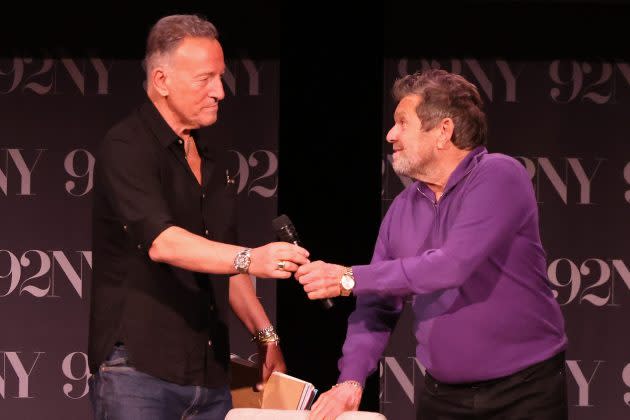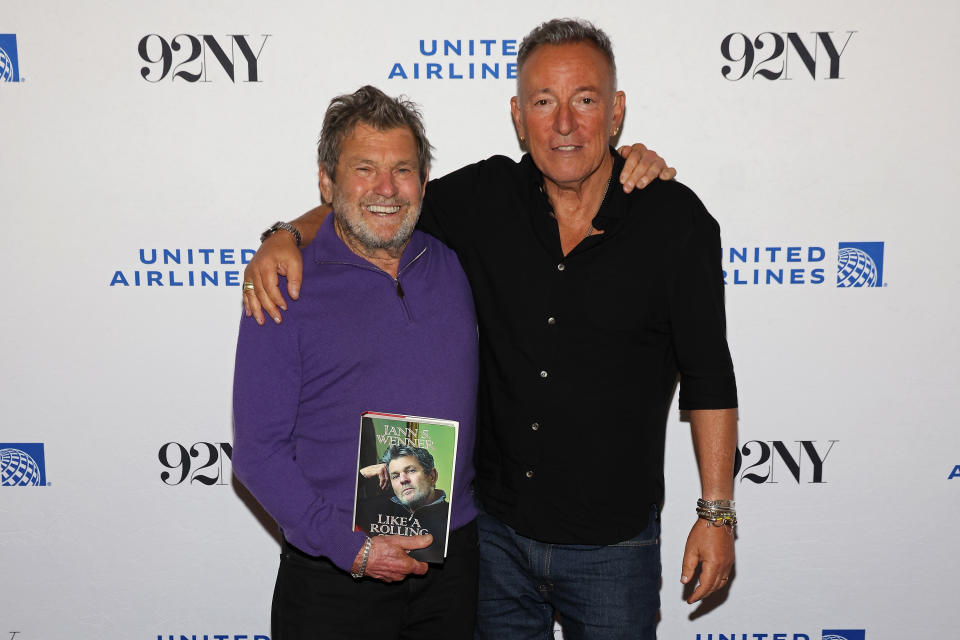Bruce Springsteen Takes Rolling Stone Founder Jann Wenner to Task for ‘Born to Run’ Slight
- Oops!Something went wrong.Please try again later.
- Oops!Something went wrong.Please try again later.

To paraphrase Dr. Hook and the Medicine Show, getting on the cover of Rolling Stone was a major goal for any rock artist, and midway through a one-hour conversation with Rolling Stone founder Jann Wenner at the 92nd Street Y in New York City Tuesday night, Bruce Springsteen had a bone to pick about that very subject.
“I was not on the cover of Rolling Stone when ‘Born to Run’ came out, you know,” he pointed out. “I’m not picking a bone or anything, but I always felt — while we’re talking about it — they were a little skittish about putting me on the cover when that record came out. I was on the cover of Time and Newsweek.”
More from Variety
Wenner countered that those magazines were “the establishment” and that Springsteen making the covers of both was a subject of intense controversy. Springsteen lamented that the attention attracted an unlikely fan: the Internal Revenue Service.
“I hadn’t paid a penny in taxes when I was on the cover of Time and Newsweek, and the IRS found out about it and it took me 10 years [to pay it],” he quipped.
Not everybody wanted to be on the cover. Wenner revealed that Joni Mitchell was the one artist that did decline the honor.
While Springsteen’s financial woes were covered in a previous book talk with Tom Hanks at the Tribeca Film Festival in 2017 promoting his autobiography, “Born to Run,” the Boss was on hand as moderator discussing Wenner’s new memoir, “Like a Rolling Stone.”
Springsteen kicked off the hour-long talk escorting Wenner onstage for the chat, which took a deep dive into Wenner’s childhood growing up as a “typical post-war baby boomer,” making up his own publications in boarding school (he named one “The Sardine”) and eventually becoming a student at Berkeley, before dropping out and founding Rolling Stone in 1967.
Wenner, who has undergone open heart surgery, two back operations and four eye operations, took to his seat slowly, but was animated in recalling details of his life and joking with Springsteen about their mutual Catholic upbringing, high school experiences (Wenner joined student council; Springsteen did not) and rock ‘n’ roll.
“It was the beginning of the student protests in the United States,” he remembered, of the sit-ins, bus rides, and student demonstrations. The epiphany, he said, was after hearing Joan Baez singing at one of the protests. It was his political awakening paired with his discovery of rock music. Undeterred by a rejected review of the Beatles’ “Sgt. Pepper’s Lonely Hearts Club Band” for High Fidelity magazine, Wenner founded his own, named for one of the songs of one of his favorite artists, Bob Dylan.
“There was a call out for people to seize the moment,” Wenner said. “Timing is important.”
Springsteen remembered reading the magazine growing up in his hometown of Freehold, hailing the biweekly magazine as the first he could recall writing about rock music in a serious manner.
“It was the first periodical that wrote about rock music the way I felt about it,” Springsteen said. “It was a survival guide.”
“I wanted to send that letter out and spread the word,” Wenner said.
When Springsteen said that his call to service in rock music was through writing songs and picking up an instrument, Wenner joked, “Here is where you and I part ways.”
Springsteen was also curious about Wenner’s job as editor, and how it was to streamline writers like Tom Wolfe or Hunter S. Thompson. Springsteen compared Wenner’s editorial role to that of his producer and manager, Jon Landau, who essentially played that role, paring down the excessive wordplay after his first two records.
“We did give them space,” Wenner said, “The star is the writer. You want to steer the talent in the direction it wants to go.”
Sometimes the subjects interviewed were easy marks. Wenner said Springsteen, U2’s Bono and the Who’s Pete Townshend are easy to interview, needing only one question to prompt a conversation, while Dylan and Rolling Stones frontman Mick Jagger are more difficult.
“Neither of them really wants to say much about themselves or reveal too much and are almost in a way kind of bored with it,” he said.

Who else is a tough nut to crack? Politicians.
“Politicians are tough because they are so programmed… [Everything has] been pre-tested and polled and what the right position is,” he said, describing former President Barack Obama as unwilling to “dis” incoming President Donald Trump the morning after the election. “It’s tough to get them off the message.”
While running through a list of artists he wished he had interviewed — Elvis Presley was mentioned —Wenner was also asked what Springsteen deemed “important questions.” To wit: Did Wenner fire an editor because they refused to put Hootie and the Blowfish on the cover? [The incident actually had to do with a bad review.] Wenner defended the band, saying the employee in question had “the wrong attitude.” He didn’t hesitate to mention that he did fire writer Dave Marsh.
Wenner also fielded a few audience questions submitted on index cards, delving into which issues of Rolling Stone Wenner would gift to aliens (the answer: any magazine with Springsteen or Dylan on the cover) and if rock ‘n’ roll has an important message for the next generation. Wenner noted that while artists like Springsteen and Dylan still have something to say, acts like the Rolling Stones aren’t writing new material anymore and when you see the show now it’s an “oldies” act.
“Not with the same intensity, but rock ‘n’ roll was married to that particularly historic moment in the ’60s,” he said. “I don’t think we can see that again.”
Springsteen also joked about getting extra stars for album reviews and referred to himself and Wenner as two “old men attempting to gracefully face our extinction.”
“Is it appropriate to still be doing rock ‘n’ roll at this age? It absolutely is,” Wenner said. “There’s still life and it’s vital. I think with age, the best thing you can look for is a sense of contentment. You lose FOMO. You got what you want. What you got is lucky. You don’t need to strive for anything more, whatever it is.”
The chat with Springsteen and Wenner will air at a later date on Sirius XM’s E Street Radio, host Jim Rotolo told Variety.
(For Variety‘s own Q&A with Wenner, click here.)
Best of Variety
'The Sopranos' Gets the Funko Pop Treatment in New Collectibles Release
From 'The Sandman' to 'Blonde': Books Made Into Movies and TV Series That You Should Read
Jennette McCurdy's Provocative Book 'I'm Glad My Mom Died' Is Already a No. 1 Bestseller
Sign up for Variety’s Newsletter. For the latest news, follow us on Facebook, Twitter, and Instagram.

